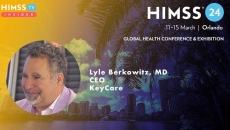HIMSS TV
Hannes Klöpper, cofounder and CEO of HelloBetter, says the U.S. health system is a convoluted array of institutions. But using DTx is one way to lower barriers to care and improve cost efficiency and access.
University Hospital Chief Information Officer Paul Contino, who serves as chair of the HIMSS global health education committee, discusses chapter involvement and networking, and explains how it has helped him grow and advance over 20 years.
Research teams work to prevent bias in algorithms by involving clinicians and partnering with established AI companies, says Dr. Alexander Ryu, vice chair of AI and innovation at Mayo Clinic.
ZeOmega uses AI to identify vulnerable patient populations and suggest ways to improve their health outcomes. Pravin Pant, the company's VP of advanced analytics, and Michael Gould, its associate VP of interoperability strategy, explain.
Aytan Dahukey, partner and leader of Sheppard Mullin's private equity team, says there's a lot of cash ready to deploy – but private equity buyers need sellers who have realistic value expectations.
HIMSS24
Through Epic, KeyCare is expanding access to all types of care providers by partnering and coordinating with health systems rather than competing against them, says the virtual care company's CEO Dr. Lyle Berkowitz.
Connected care through the Memorial Healthcare System's mobile application gets patients engaged and taking more control of their care, and by feeding data to EHRs, can also help to save nurses time, says Jesus Diaz, director of nursing informatics.
The interim chief digital and information officer and CMIO at New York's Mount Sinai Health System raises the curtain on the artificial intelligence the organization is using today – and what tomorrow is likely to look like.
Dr. Harm Scherpbier, CMIO of HealthShare Exchange, says new technologies are being developed to work alongside EHR systems that have been built for traditional fee-for-service, enabling data sharing for accountable care models.
Although executives may feel pressured to use "error-prone" generative AI, mature, proven machine learning applications should be deployed in clinical settings first, contends Ran Balicer, HIMSS board of directors member.










